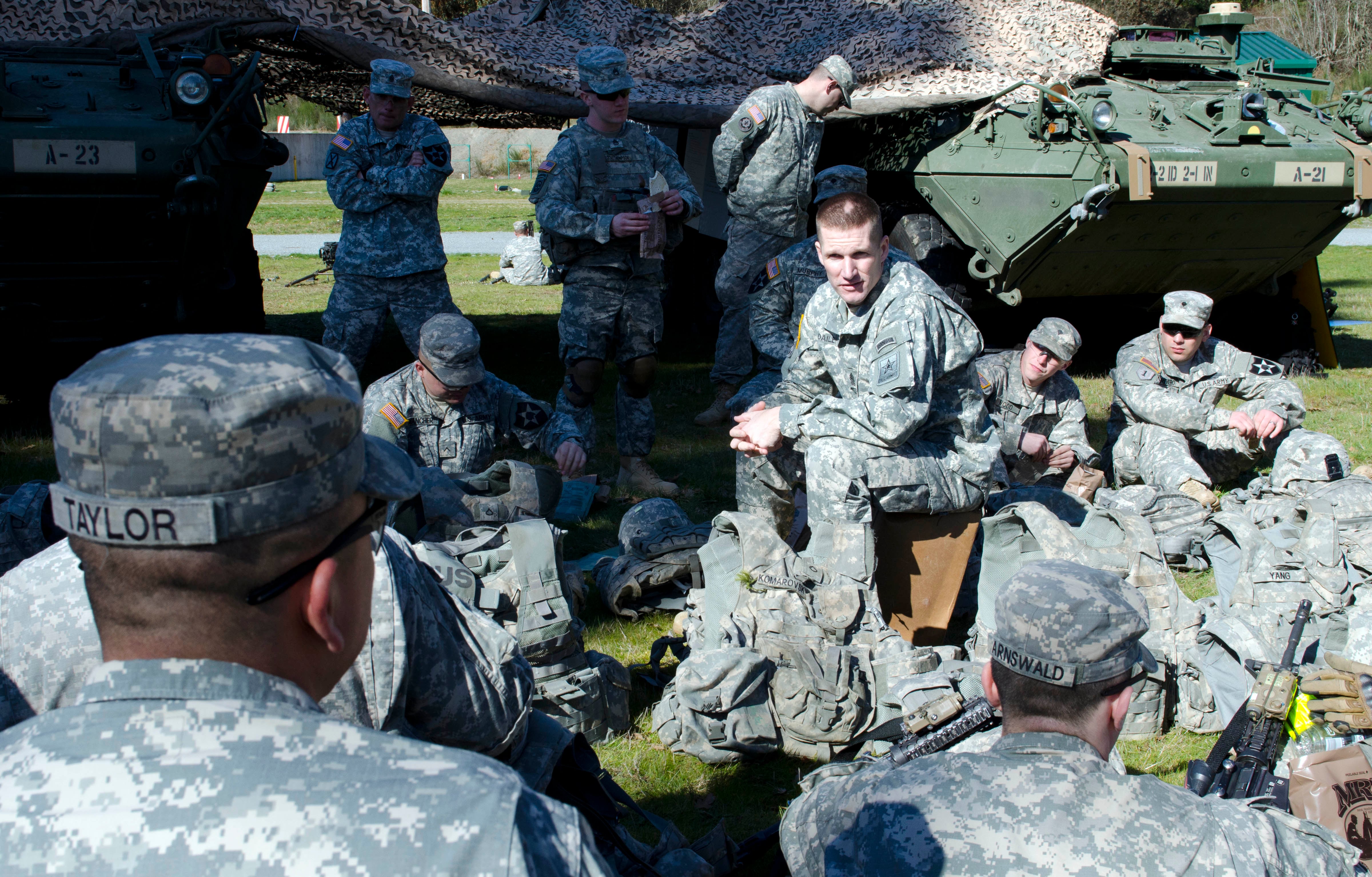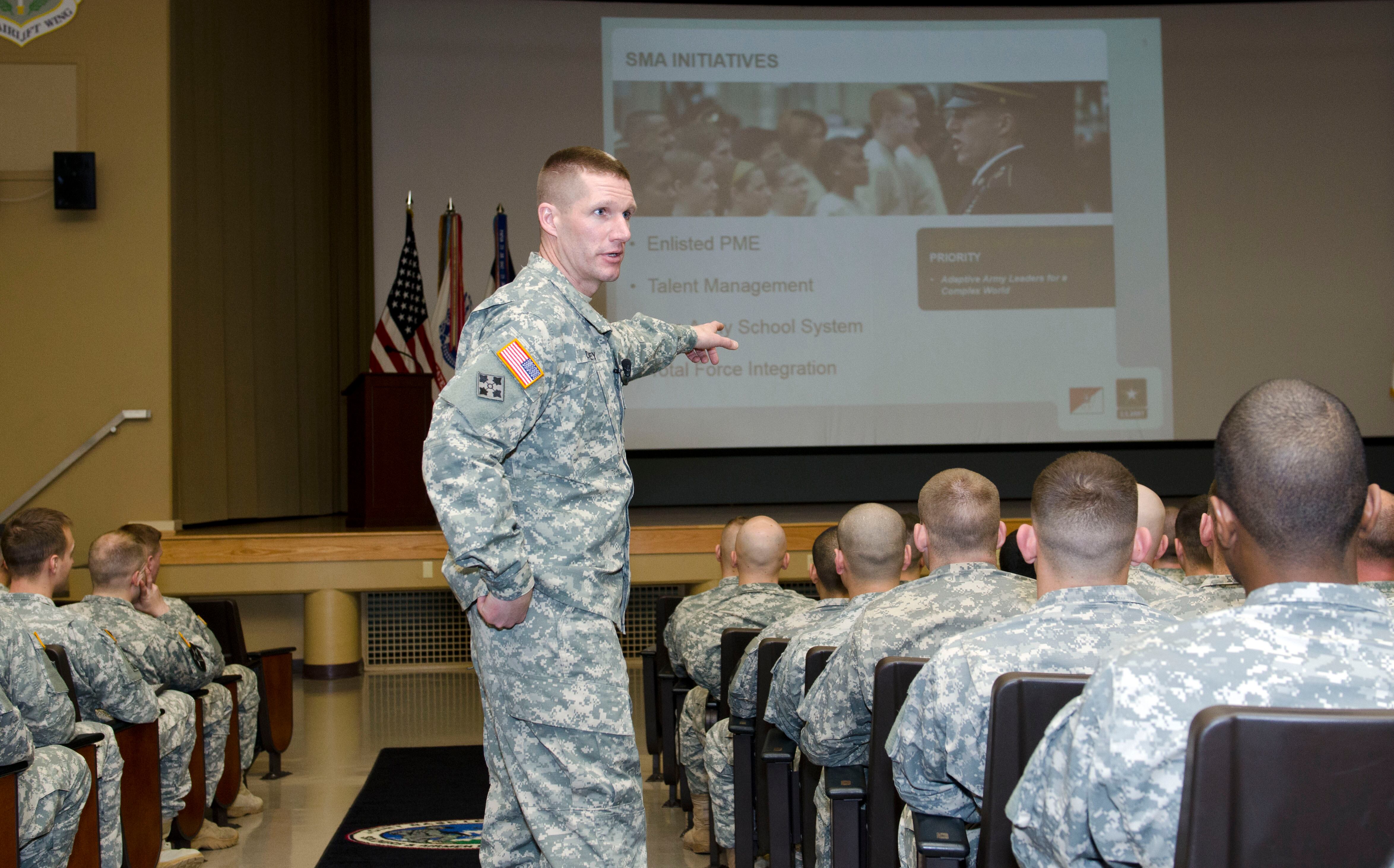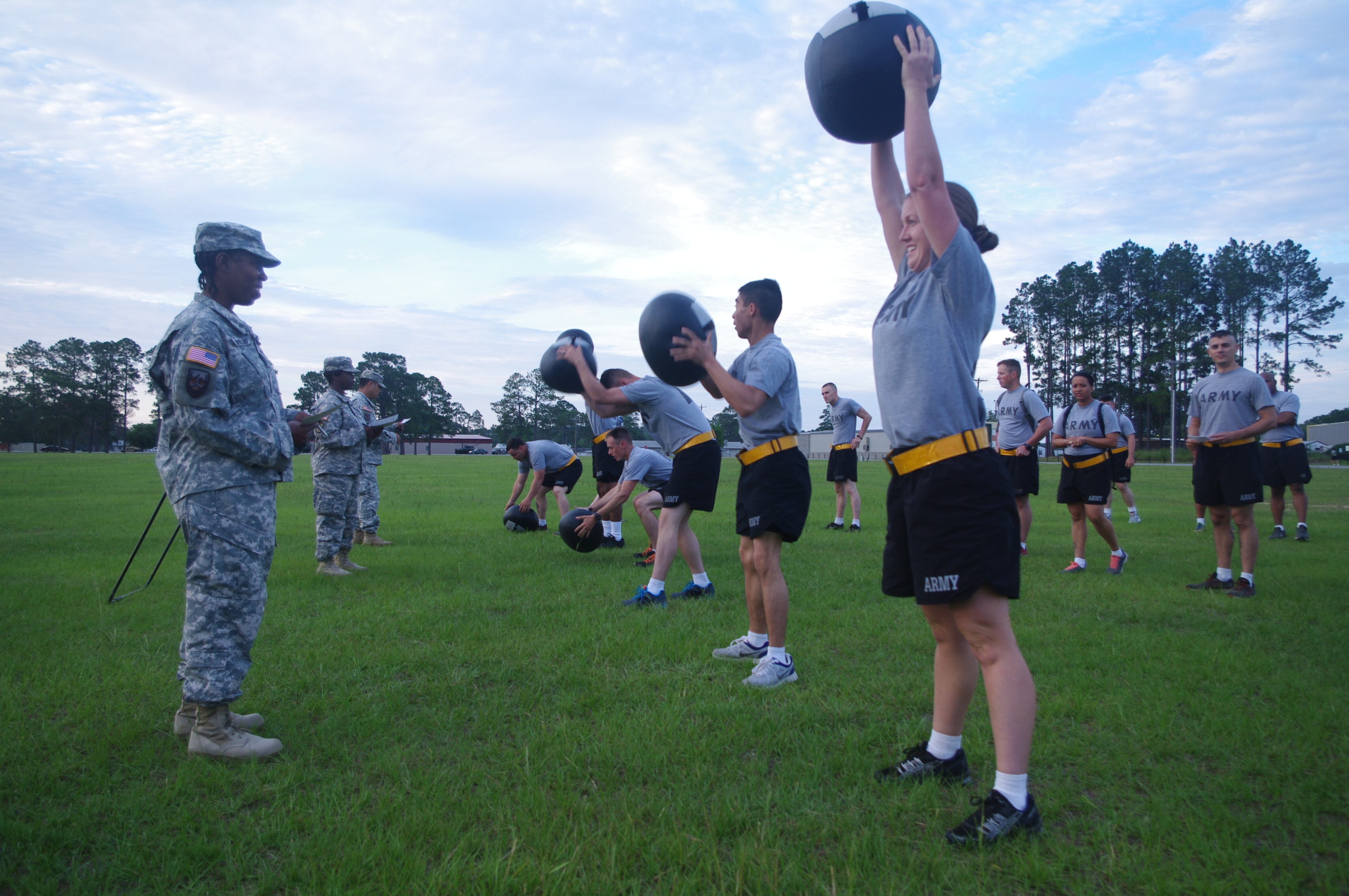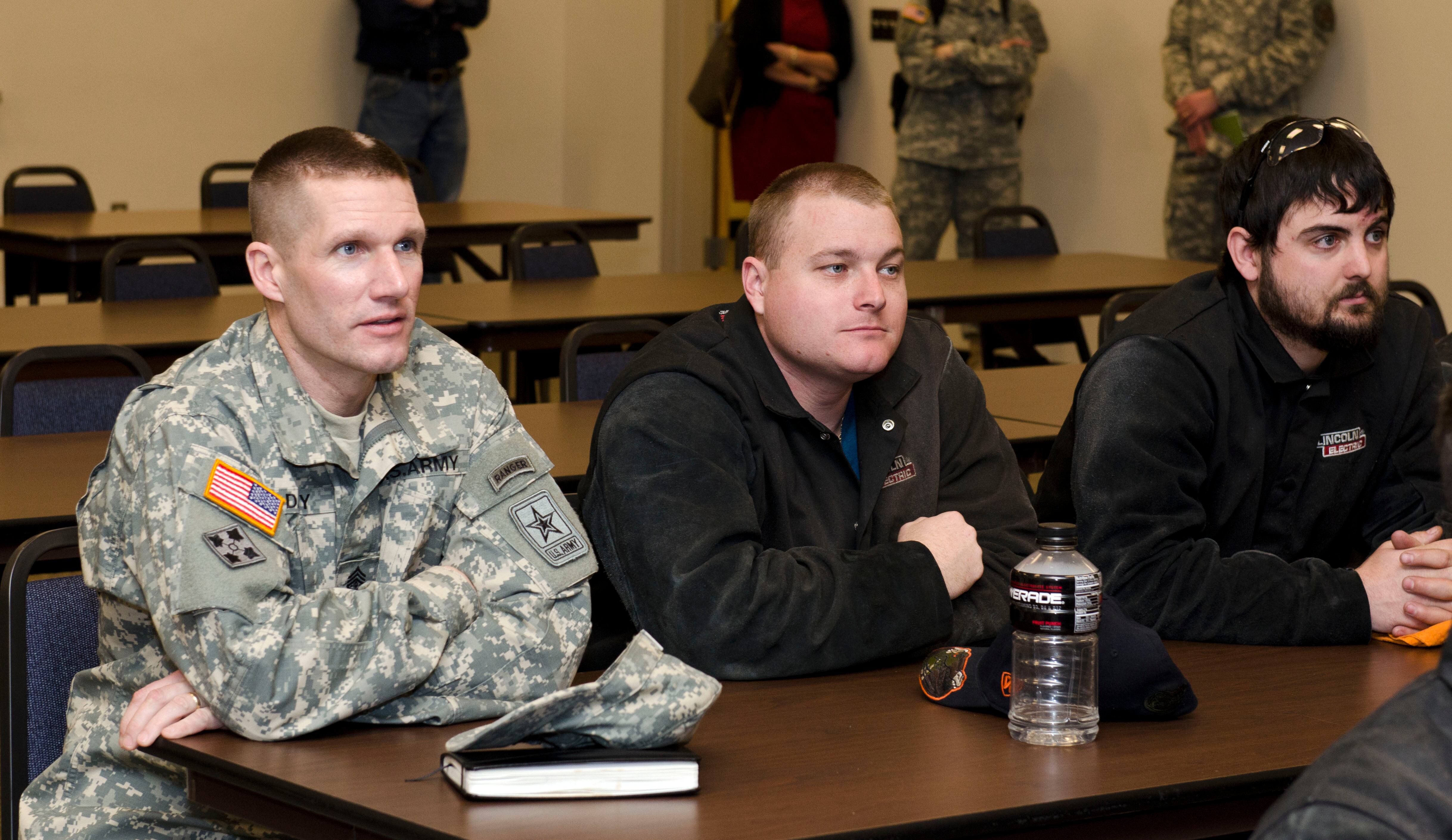JOINT BASE LEWIS-McCHORD, Wash. — Just one month into his tenure, Sergeant Major of the Army Dan Dailey already has an extensive to-do list as the service grapples with a drawdown, increasing demands around the world and shrinking budgets that threaten readiness, family programs and morale.
Dailey invited Army Times on the trip to listen to soldier concerns and learn more about his personal plans to represent the enlisted force.

Sergeant Major of the Army Dan Dailey speaks with soldiers during his visit to Joint Base Lewis-McChord, Wash.
Photo Credit: Sgt. Ryan Hallock/Army
Protecting your pay.
The Army will cut the active-duty force to 490,000 by the end of this fiscal year, and shrinking budgets will force even further reductions for an end-strength of 450,000 by 2017. If sequestration returns in 2016, the Army could be reduced to 420,000 active-duty soldiers, with cuts slated for the Army National Guard and Army Reserve as well.
"I share the same concerns the chief of staff does," Dailey said. "We have to make sure our soldiers are ready. Not just from a training perspective, which is paramount, but personnel readiness, family readiness, making sure they have the right equipment."
Army leaders have a "red line," Dailey said.
"We're not willing to go below this level to man, train and equip this Army," he said. "And if we have to, we're going to assume significant risk. I think we've made that very clear to our civil leaders."
Part of Dailey's job is to represent the Army's enlisted soldiers, and he did just that on Capitol Hill on Feb. 25.
Just before leaving on his visit to JBLM, Dailey and the senior enlisted leaders from the other services shared their concerns about the budget and potential changes to benefits such as health care and family programs.
With the Military Compensation and Retirement Modernization Commission proposing sweeping reforms to military pay and benefits packages and the White House's proposed 2016 budget pitching cost-savings measures like health care fee hikes and commissary cutbacks, the men implored Congress to protect family benefits.

Sergeant Maj. of the Army Dan Dailey discusses the future of the Army with soldiers at a town hall meeting March 3 at Joint Base Lewis-McChord, Wash.
Photo Credit: Sgt. Ryan Hallock/Army
"In my four deployments … never once did a soldier say, 'I'm worried about my family,'" Dailey said during his testimony. "I'm concerned that someday, that will be an issue."
During the town hall at JBLM, Dailey was asked about possible changes to retirement benefits, as proposed by the commission.
"The most expensive thing in the United States Army is us," Dailey said. "That cost is exponentially growing faster than the rate of inflation. If we continue to provide the programs and services and pay we have now, in the future, it's unsustainable. We will become too expensive for ourselves."
However, the Army must balance rising costs with providing for soldiers, he said.
"There's no intent to erode our benefits, but we want to take a look at where we can find efficiencies," Dailey said.
The Army is still studying the commission's recommendations, he said.
"We're still working through that, but I made it clear when I testified that we're not making recommendations until we clearly know the effects on our service members," Dailey said. "We're not going to make any rash decisions."
Improving physical fitness.
"PT probably isn't the most important thing you're going to do that day, but it is the most important thing you do every day," Dailey said. "It's something, to be fully honest with you, the Army lost focus on during combat. We saw a degradation of physical fitness during the war. We've got to get soldiers back to that."
Physically fit soldiers are healthier over time, and they're ready for any mission they might be called upon to do, said Dailey, who is known for being a runner and leading punishing physical fitness training sessions with his team.
Fitness also is a "key component" in a soldier's career, he said.
"We've got to continue reinforcing to soldiers that this is a big part of their careers," Dailey said. "It's part of being the best and wanting to stay in the service as we're drawing down."
This is why soldiers are now required to pass the Army's physical fitness test before they can complete their NCO education.
"What you grade becomes important, so I think soldiers are realizing that," he said.

Improving PT scores of soldiers is a key goal for Sergeant Major of the Army Dan Dailey.
Photo Credit: Staff Sgt. Aaron Knowles/Army
"If you're going to have to get to school to be promoted, part of that is being physically fit," Dailey said. "We have to work hard to get soldiers back to the right mindset, and it's got to be tough, realistic, demanding PT."
Dailey also called on leaders across the Army to PT with their soldiers.
"If they're not out there leading by example, their soldiers probably aren't out there, either," Dailey said. "All they want is to see you out there, so you have to lead physical fitness."
Sometimes a leader's presence alone is enough to inspire soldiers, Dailey said.
"Showing you can show up there, still be a soldier, lead from the front, take them out for unit runs, those little things have huge impacts over time," he said.
Sharpening enlisted professional military education.
"The chief's No. 1 priority is adaptive leaders for a complex world," Dailey said during a March 3 town hall meeting with soldiers here. "We are, and have been, involved in a very complex world. You see that every day, from ISIS to the Ebola fight to the Korean peninsula. As we face increasingly complex situations, and we will, the best thing to invest in is adaptive leaders."
One way for Dailey, who previously was the command sergeant major for Training and Doctrine Command, to achieve that goal is through enlisted PME, he said.
"We're working very hard to make it a progressive, sequential and complementary system," he said.
Nothing in the Army happens without leadership, Dailey has told Army Times.
"We are not a materiel service," he said. "Nothing against the other services, but we don't have the big boats, we don't have the airplanes, but what we do have is people."
The Army is "building every level of NCO education," Dailey said. "We're continuing to increase standards across the board. Why? Because we can, and to give you the maximum equivalency in the civilian world."
Upcoming changes to enlisted PME will give soldiers "equivalent credit for everything you do in the Army" with equivalent civilian college credit or certifications, he said.
The Army also is working to grow its credentialing program, which will give soldiers formal recognition for the skills they gain in the Army
This will enable soldiers to better document their Army training and experience after they leave the service and enter the civilian job market.
So far, the Army has completed more than 80 credentialing opportunities, Dailey said. The goal is to credential every military occupational specialty in the Army.
"We have a lot more work to do," he said.
Maintaining readiness.
The top priority at Forces Command is readiness, Dailey said, and the possibility of new deployments is a "big concern" for soldiers.
During the town hall meeting here, as well as during a meeting with Warrior Leader Course students, many asked Dailey about whether they might see future deployments to Iraq or Ukraine.
"A big concern for soldiers right now is what does the future look like," Dailey said. "To be fully honest with you, I don't know."
But "the world is a complex place, and I need you to be ready," Dailey said to soldiers.
The Army must maintain its readiness, and the regionally-aligned forces concept is a key way of doing that, he said.
Regional alignment allows the Army to grow its cultural knowledge and experience, something it lacked when it went into Iraq and Afghanistan, he said.
"Now, during peacetime, we're working with our partners," he said. "We are geographically focused, and we'll continue to focus geographically."
Soldiers can do their part by focusing on unit readiness and training, he said.
NCOs can play a role by sharing their combat experiences, he said.
"We need to capitalize on the lessons they've learned over the last 12 or 13 years of war because when we lose that generation of leaders, because we will over time, we can't lose that skill set," he said. "Our noncommissioned officers need to know they need to pass it on, because they are the value right now. They are the lessons learned, and they are the encyclopedias of information."
The Army will do its part, too, Dailey said.
"We can't ever say we're going to send soldiers into harm's way without what they need," he said. "We're going to make sure you have what you need."
Drawing down wisely.
The Army's ongoing drawdown is "the No. 1 concern I hear from soldiers," Dailey said.
"Unfortunately, it's going to make our Army smaller," he said. "But I believe there's plenty of room in our Army for soldiers who want to stay."
In order to retain the Army's best and brightest, the service is managing accessions and retention and using tools such as the qualitative management and service programs, Dailey said.
"If you want to stay in the Army, do your best," he said.
When a soldier asked Dailey how he managed to become the youngest soldier to ever serve as the sergeant major of the Army, he said he worked hard and set goals for himself.
"I took personal ownership of everything I did," he did. "You've got to take all the tough assignments. You have to get out of your comfort zone. Take care of soldiers."
Dailey also credited timing and the great leaders who helped him along the way.
"There's opportunity here for everybody," he said. "That's what I love about the Army."
And one more thing: have fun, Dailey said.
"You have to have fun, and you have to create an environment for your soldiers to have fun," he said.
Helping transitioning soldiers.
More than 9,500 soldiers are expected to leave the service from JBLM in the next year, officials told Dailey when he stopped by the post's transition services program.
In addition, the Army pays about $25 million in unemployment compensation a year to Washington state residents.
Those two factors drove JBLM to create several apprenticeship programs designed to train transitioning soldiers for jobs in fields such as welding, truck driving and plumbing. JBLM also partnered with Microsoft to train soldiers to work in the cyber and information technology fields.

Sergeant Major of the Army Dan Dailey watches a film about the Veterans in Piping Program for transitioning soldiers. Expanding apprenticeship programs for soldiers is high on SMA's priority list.
Photo Credit: Sgt. Ryan Hallock/Army
"This is what makes Soldier for Life more than a bumper sticker," Dailey told the group at JBLM.
He later told Army Times he was surprised by how much work officials at JBLM had put into transition programs.
"They're doing a lot more than I thought," he said.
His task now is to take these best practices back to Army leaders and grow these programs across the rest of the force, he said.
During his visit, Dailey also met with soldiers in a number of these apprenticeship program.
His advice to them? "When you get out there, there are going to be a lot of competing challenges in life, but you can do it. Use the knowledge and experience you have here, and use the benefits the Army gave you. You've earned it."
Preserving the health of the force.
Commitment to the Army profession and building trust between leaders and soldiers are key focus areas for Dailey.
"Every day you come to work, I want you to ask yourself, 'who do you trust?'" Dailey said during the town hall meeting. "And I want you to ask yourself, 'do your soldiers trust you?' You've got to have trust, regardless of gender, regardless of who you are."
Dailey also is focused on determining if the Army is putting too many requirements on the chain of command.
Odierno tasked him with talking to soldiers — officers and NCOs — about the demands placed on them, from mandatory training requirements to administrative tasks, he said.
"We can't ask them to do too much," Dailey said. "This is a tough mission, it's going to be tough to achieve, but it's got to be achievable."
The directive from Odierno came after a recently released study by two Army War College professors showed some officers were lying in order to maintain compliance with ever-increasing training requirements, requests for information and reams of mandatory paperwork.
"Lying to Ourselves: Dishonesty in the Army Profession" showed that efforts to keep up with mounting requirements resulted in "ethical fading," where cutting corners and checking boxes in an effort to satisfy requirements becomes a common enough practice that moral objections to it eventually disappear.
The Army must have "an honest, professional discussion about it," Dailey told Army Times.
"We have added a lot of requirements in the last 10 years," he said. "We've got to make sure we go back and look and see if there are too many requirements and not enough time to accomplish them."
The Army takes this issue seriously, Dailey said, and "I would be lying to you if I said there wasn't some truth to it."
Fighting sexual assault.
Dailey, a career infantryman, has created a new grassroots campaign he hopes will empower NCOs to fight sexual assault in the ranks.
Called "Not in my squad," the campaign was inspired by discussions during the Army's recent Sexual Harassment/Assault Response and Prevention summit, which brought together top leaders and command teams from across the Army. Featured in the discussion was a campaign launched by cadets at West Point called Cadets Against Sexual Harassment and Assault, Dailey said.
"They've done this on their own. They've said, 'This is our problem. We need to fix it at our level, and it'll no longer be a problem,'" he said. "What better than to bring that into our NCO corps?"
"Not in my squad" puts "first-line leaders" directly into the fight against sexual assault and sexual harassment, an issue that is among the top priorities for senior Army leaders.
"It's the ownership of more than SHARP, too," Dailey said. "A soldier says, 'These are my soldiers. Nobody messes with my soldiers. I take that personally. It's my responsibility to ensure every facet of their lives is taken care of."
One of Dailey's first stops during his visit to JBLM was the installation's SHARP Resource Center, a first of its kind in the Army. The center consolidates all of the services available to victims of sexual assault, giving them a one-stop shop for resources and services. The center brings together personnel from the SHARP program, behavioral health, Criminal Investigation Command and the Staff Judge Advocate.
"From the Army perspective, this is the model of what right looks like," Dailey told the staff at the center. "Your hard work is being noticed. But we are by no means anywhere close to completing the mission. It's not a sprint. It's not a marathon. It's a marathon without a finish line. But the good news is we're not alone in this."
When Dailey shared his vision for "Not in my squad," he said he wanted a "bottom-up approach."
"We've got to empower young NCOs," he said. "We rely on them in combat ... [and] we've got to trust them with this. Our NCOs can do this. We just need to empower them."
As he visits with soldiers, Dailey said he is "honored and humbled" to be their sergeant major of the Army.
"It's amazing to watch them respond to some of the most dangerous and complex environments in the world," he said. "We have a long road ahead of us to go see how the rest of the soldiers across the Army are doing, but I got some good take-backs for the chief."
And his message to soldiers as he left JBLM was simple: "Your leaders do have your best interests at heart."
Listening to you
Beyond his own goals, Dailey said he wants to hear directly from you.
Odierno "asked me specifically how our soldiers and families are doing, what's on their minds, what they're worried about," said Dailey, as he wrapped up his first troop visit since being sworn in Jan. 30 as the Army's top enlisted soldier.
His first stop was here at Joint Base Lewis-McChord, where he spent two days meeting with soldiers, fielding their questions and learning more about the installation's sexual assault prevention efforts and its programs to help transitioning soldiers prepare for civilian life.
Now that his JBLM trip is over, Dailey said he will spend even more time on the road. He plans to visit all of the posts that are home to the Army's corps and divisions in the next 90 days.
"I think we're going to be able to do that, then I'll report back to the secretary and chief with a 90-day posture statement with the issues, concerns, and my recommendations," Dailey said.
As he listened to soldiers at JBLM, first in smaller groups and later in a post-wide town hall meeting, Dailey said it is "pretty clear" what soldiers are concerned about.
"They're concerned about the drawdown, they're concerned about the complex environment around the world," he said.
Dailey has his concerns, too, and he spent much of his time sharing with soldiers his initiatives and to-do list as the Army wrestles with a shrinking force, the threat of sequestration and demands around the world.
Staff writers Patricia Kime and Kevin Lilley contributed to this report.
Michelle Tan is the editor of Army Times and Air Force Times. She has covered the military for Military Times since 2005, and has embedded with U.S. troops in Iraq, Afghanistan, Kuwait, Haiti, Gabon and the Horn of Africa.





